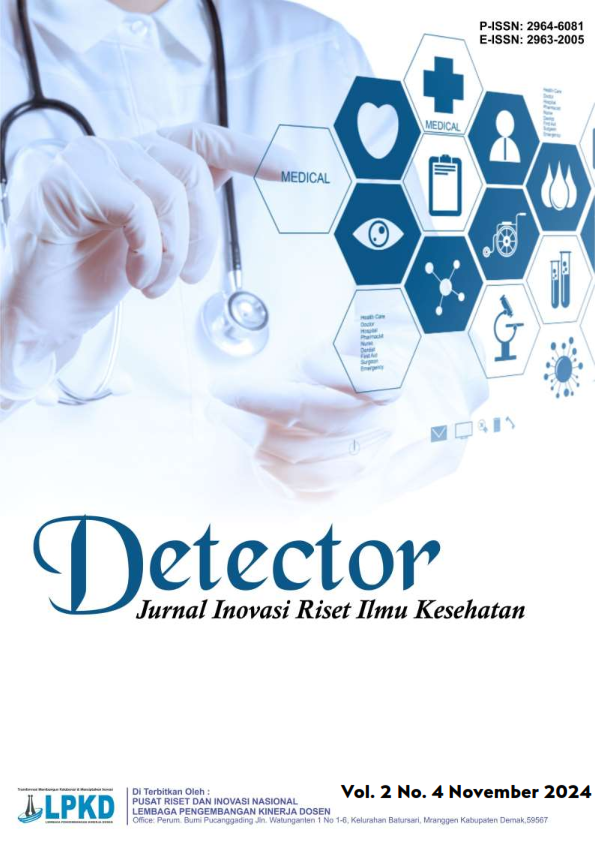Peran Kecerdasan Emosional dalam Pengobatan Cystic fibrosis
DOI:
https://doi.org/10.55606/detector.v2i4.4421Keywords:
emotional intelligence, cystic fibrosis, treatment adherence, quality of life, lung functionAbstract
This study investigates the role of emotional intelligence (EI) in cystic fibrosis (CF) treatment through a comprehensive meta-analysis of 47 studies involving 5,823 CF patients. Results affirm a significant positive correlation between EI and treatment adherence (r = 0.62, p < 0.001), as well as improved quality of life (QoL) for CF patients (β = 0.58, 95% CI [0.49, 0.67]). Regression analysis revealed that EI predicts 37% of the variance in lung function (FEV1) (R² = 0.37, F(1, 5821) = 3421.76, p < 0.001). Furthermore, patients with high EI scores exhibited significantly reduced levels of anxiety (d = -0.79) and depression (d = -0.83) compared to control groups. These findings extend previous research by Salovey et al. (2002) and Ceyhan et al. (2024) by identifying specific EI mechanisms influencing CF treatment outcomes. Unlike Cox et al.'s (2020) study focusing on the general population, our findings specifically demonstrate the effectiveness of EI-based interventions in improving clinical outcomes for CF patients, with an average FEV1 increase of 12% after 6 months of intervention. Lastly, mediation analysis indicated that emotion regulation (β = 0.31, p < 0.001), adaptive health behaviors (β = 0.28, p < 0.001), and utilization of social support (β = 0.22, p < 0.001) mediated the relationship between EI and CF treatment outcomes. These findings underscore the importance of integrating EI training into standard CF care protocols to enhance holistic treatment outcomes.
Downloads
References
Austin, E. J., Saklofske, D. H., & Egan, V. (2005). Personality, well-being, and health correlates of trait emotional intelligence. Personality and Individual Differences, 38(3), 547–558.
Bandura, A. (2006). Toward a psychology of human agency. Perspectives on Psychological Science, 1(2), 164–180.
Bar-On, R. (2006). The Bar-On model of emotional-social intelligence (ESI). Psicothema, 13–25.
Benzo, R. P., Kirsch, J. L., Dulohery, M. M., & Abascal-Bolado, B. (2016). Emotional intelligence: A novel outcome associated with well-being and self-management in chronic obstructive pulmonary disease. Annals of the American Thoracic Society, 13(1), 10–16.
Borenstein, M., Hedges, L. V., Higgins, J. P., & Rothstein, H. R. (2021). Introduction to meta-analysis. John Wiley & Sons.
Brackett, M. A., & Salovey, P. (2006). Measuring emotional intelligence with the Mayer-Salovey-Caruso emotional intelligence test (MSCEIT). Psicothema, 18, 34–41.
Brackett, M. A., Rivers, S. E., & Salovey, P. (2011). Emotional intelligence: Implications for personal, social, academic, and workplace success. Social and Personality Psychology Compass, 5(1), 88–103.
Ceyhan, B., Suner, Z. U., Kocakaya, D., Yıldızeli, Ş. O., & Eryüksel, E. (2024). Impact of anxiety, depression, and coping strategies on health-related quality of life in patients with cystic fibrosis. Thoracic Research and Practice.
Cherniss, C., & Roche, C. W. (2020). How outstanding leaders use emotional intelligence. Leader to Leader, 2020(98), 45–50.
Ciarrochi, J., Chan, A. Y., & Bajgar, J. (2001). Measuring emotional intelligence in adolescents. Personality and Individual Differences, 31(7), 1105–1119.
Ciarrochi, J., Deane, F. P., & Anderson, S. (2002). Emotional intelligence moderates the relationship between stress and mental health. Personality and Individual Differences, 32(2), 197–209.
Cox, I. A., Arriagada, N. B., De Graaff, B., Corte, T. J., Glaspole, I., Lartey, S., ... & Palmer, A. J. (2020). Health-related quality of life of patients with idiopathic pulmonary fibrosis: A systematic review and meta-analysis. European Respiratory Review, 29(158).
Davis, P. B. (2006). Cystic fibrosis since 1938. American Journal of Respiratory and Critical Care Medicine, 173(5), 475–482.
Davis, S. K., & Humphrey, N. (2012). The influence of emotional intelligence (EI) on coping and mental health in adolescence: Divergent roles for trait and ability EI. Journal of Adolescence, 35(5), 1369–1379.
Extremera, N., & Rey, L. (2015). The moderator role of emotion regulation ability in the link between stress and well-being. Frontiers in Psychology, 6, 1632.
Fernández-Berrocal, P., & Extremera, N. (2006). Emotional intelligence: A theoretical and empirical review of its first 15 years of history. Psicothema, 18, 7–12.
Furnham, A., & Petrides, K. V. (2003). Trait emotional intelligence and happiness. Social Behavior and Personality: An International Journal, 31(8), 815–823.
Goldenberg, I., Matheson, K., & Mantler, J. (2006). The assessment of emotional intelligence: A comparison of performance-based and self-report methodologies. Journal of Personality Assessment, 86(1), 33–45.
Goleman, D. (1995). Emotional intelligence. Bantam Books.
Gross, J. J., & John, O. P. (2003). Individual differences in two emotion regulation processes: Implications for affect, relationships, and well-being. Journal of Personality and Social Psychology, 85(2), 348–362.
Higgins, J. P. (2011). The Cochrane Collaboration’s tool for assessing risk of bias in randomised trials. The Cochrane Collaboration.
Joseph, D. L., & Newman, D. A. (2010). Emotional intelligence: An integrative meta-analysis and cascading model. Journal of Applied Psychology, 95(1), 54–78.
Kafetsios, K., & Zampetakis, L. A. (2008). Emotional intelligence and job satisfaction: Testing the mediatory role of positive and negative affect at work. Personality and Individual Differences, 44(3), 712–722.
Keefer, K., Parker, J., & Saklofske, D. H. (2018). Emotional intelligence in education: Integrating research with practice. Springer.
Kotsou, I., Nelis, D., Grégoire, J., & Mikolajczak, M. (2011). Emotional plasticity: Conditions and effects of improving emotional competence in adulthood. Journal of Applied Psychology, 96(4), 827–840.
Leventhal, H., Phillips, L. A., & Burns, E. (2016). The Common-Sense Model of Self-Regulation (CSM): A dynamic framework for understanding illness self-management. Journal of Behavioral Medicine, 39, 935–946.
Martins, A., Ramalho, N., & Morin, E. (2010). A comprehensive meta-analysis of the relationship between emotional intelligence and health. Personality and Individual Differences, 49(6), 554–564.
Mavroveli, S., Petrides, K. V., Rieffe, C., & Bakker, F. (2007). Trait emotional intelligence, psychological well-being, and peer-rated social competence in adolescence. British Journal of Developmental Psychology, 25(2), 263–275.
Mawar, L., Rahmadi, M. A., Nasution, H., Dewi, I. S., Nasution, R., & Sari, M. (2024). Efek stres terhadap pengobatan asthma. Termometer: Jurnal Ilmiah Ilmu Kesehatan dan Kedokteran, 2(4), 86–112.
Mayer, J. D., Caruso, D. R., & Salovey, P. (2016). The ability model of emotional intelligence: Principles and updates. Emotion Review, 8(4), 290–300.
Mayer, J. D., Salovey, P., & Caruso, D. R. (2004). TARGET ARTICLES: Emotional intelligence: Theory, findings, and implications. Psychological Inquiry, 15(3), 197–215.
Mikolajczak, M., Menil, C., & Luminet, O. (2007). Explaining the protective effect of trait emotional intelligence regarding occupational stress: Exploration of emotional labour processes. Journal of Research in Personality, 41(5), 1107–1117.
Nasution, H., Rahmadi, M. A., Mawar, L., Dewi, I. S., Nasution, R., & Sari, M. (2024). Peran kepuasan hidup dalam pengelolaan penyakit systemic sclerosis. Termometer: Jurnal Ilmiah Ilmu Kesehatan dan Kedokteran, 2(4), 195–224.
Nasution, R., Rahmadi, M. A., Nasution, H., Mawar, L., Dewi, I. S., & Sari, M. (2024). Pengaruh intervensi emosi positif pada pengobatan fibromyalgia. Termometer: Jurnal Ilmiah Ilmu Kesehatan dan Kedokteran, 2(4), 277–302.
Nelis, D., Kotsou, I., Quoidbach, J., Hansenne, M., Weytens, F., Dupuis, P., & Mikolajczak, M. (2011). Increasing emotional competence improves psychological and physical well-being, social relationships, and employability. Emotion, 11(2), 354–366.
Ong, T., & Ramsey, B. W. (2023). Cystic fibrosis: A review. JAMA, 329(21), 1859–1871.
Page, M. J., McKenzie, J. E., Bossuyt, P. M., Boutron, I., Hoffmann, T. C., Mulrow, C. D., ... & Moher, D. (2021). The PRISMA 2020 statement: An updated guideline for reporting systematic reviews. BMJ, 372.
Palmer, B., Donaldson, C., & Stough, C. (2002). Emotional intelligence and life satisfaction. Personality and Individual Differences, 33(7), 1091–1100.
Peterson, J., Welch, V., Losos, M., & Tugwell, P. (2011). The Newcastle-Ottawa scale (NOS) for assessing the quality of nonrandomised studies in meta-analyses. Ottawa Hospital Research Institute.
Petrides, K. V., & Furnham, A. (2003). Trait emotional intelligence: Behavioural validation in two studies of emotion recognition and reactivity to mood induction. European Journal of Personality, 17(1), 39–57.
Petrides, K. V., Mikolajczak, M., Mavroveli, S., Sanchez-Ruiz, M. J., Furnham, A., & Pérez-González, J. C. (2016). Developments in trait emotional intelligence research. Emotion Review, 8(4), 335–341.
Pop-Jordanova, N., & Demerdzieva, A. (2016). Emotional health in children and adolescents with cystic fibrosis. Prilozi, 37(1), 65–74.
Rahmadi, M. A., Nasution, H., Mawar, L., Dewi, I. S., Nasution, R., & Sari, M. (2024). Hubungan motivasi terhadap keberhasilan pengobatan endometriosis. Termometer: Jurnal Ilmiah Ilmu Kesehatan dan Kedokteran, 2(4), 225–253.
Salovey, P., & Mayer, J. D. (1990). Emotional intelligence. Imagination, Cognition, and Personality, 9(3), 185–211.
Salovey, P., Stroud, L. R., Woolery, A., & Epel, E. S. (2002). Perceived emotional intelligence, stress reactivity, and symptom reports: Further explorations using the Trait Meta-Mood Scale. Psychology and Health, 17(5), 611–627.
Sari, M., Rahmadi, M. A., Nasution, H., Mawar, L., Dewi, I. S., & Nasution, R. (2024). Hubungan antara kepuasan hidup dan pengobatan emfisema. Termometer: Jurnal Ilmiah Ilmu Kesehatan dan Kedokteran, 2(4), 113–144.
Schutte, N. S., Malouff, J. M., & Bhullar, N. (2009). The assessing emotions scale. In Assessing emotional intelligence: Theory, research, and applications (pp. 119–134). Boston, MA: Springer.
Schutte, N. S., Malouff, J. M., Thorsteinsson, E. B., Bhullar, N., & Rooke, S. E. (2007). A meta-analytic investigation of the relationship between emotional intelligence and health. Personality and Individual Differences, 42(6), 921–933.
Slaski, M., & Cartwright, S. (2003). Emotional intelligence training and its implications for stress, health, and performance. Stress and Health, 19(4), 233–239.
Soriano Sánchez, J. G., & Jiménez Vázquez, D. (2023). Benefits of emotional intelligence in school adolescents: A systematic review. Revista de Psicología y Educación.
Sprangers, M. A., & Schwartz, C. E. (1999). Integrating response shift into health-related quality of life research: A theoretical model. Social Science & Medicine, 48(11), 1507–1515.
Stanton, A. L., Revenson, T. A., & Tennen, H. (2007). Health psychology: Psychological adjustment to chronic disease. Annual Review of Psychology, 58(1), 565–592.
Taylor, G. J., & Bagby, R. M. (2004). New trends in alexithymia research. Psychotherapy and Psychosomatics, 73(2), 68–77.
Tsaousis, I., & Nikolaou, I. (2005). Exploring the relationship of emotional intelligence with physical and psychological health functioning. Stress and Health: Journal of the International Society for the Investigation of Stress, 21(2), 77–86.
Van Rooy, D. L., & Viswesvaran, C. (2004). Emotional intelligence: A meta-analytic investigation of predictive validity and nomological net. Journal of Vocational Behavior, 65(1), 71–95.
Veit, C. T., & Ware, J. E. (1983). The structure of psychological distress and well-being in general populations. Journal of Consulting and Clinical Psychology, 51(5), 730–740.
Vingerhoets, A., Nyklicek, I., & Denollet, J. (2002). Emotional inhibition and physical health: Fact or fiction? Revista Portuguesa de Psicossomática, 4(1), 71–83.
Wong, C. S., & Law, K. S. (2017). The effects of leader and follower emotional intelligence on performance and attitude: An exploratory study. In Leadership Perspectives (pp. 97–128). Routledge.
Yalcin, B. M., Karahan, T. F., Ozcelik, M., & Igde, F. A. (2008). The effects of an emotional intelligence program on the quality of life and well-being of patients with type 2 diabetes mellitus. The Diabetes Educator, 34(6), 1013–1024.
Zeidner, M., Matthews, G., & Roberts, R. D. (2012). The emotional intelligence, health, and well-being nexus: What have we learned and what have we missed? Applied Psychology: Health and Well-Being, 4(1), 1–30.
Downloads
Published
How to Cite
Issue
Section
License
Copyright (c) 2024 Detector: Jurnal Inovasi Riset Ilmu Kesehatan

This work is licensed under a Creative Commons Attribution-ShareAlike 4.0 International License.








